 Mariana Abdalla/MSF
Analysis
Mariana Abdalla/MSF
Analysis
06/05/2023
Laure Wolmark
This article was published on March 27th, 2023 in the journal Alternatives Humanitaires, in an edition focused on mental health.
 Todd Brown
Interview
Todd Brown
Interview
06/30/2023
Bertrand Taithe
Fabrice Weissman
Mickaël Le Paih
The central question raised in this discussion relates to two profoundly intermeshed issues for humanitarian practitioners and organisations: the use of history for humanitarian organisations, and the need for them to preserve and maintain archives
 Djerabe Ndegrgar
Opinion
Djerabe Ndegrgar
Opinion
12/30/2022
Michel-Olivier Lacharité
This article was published on December 26th, 2022 on the Souk, the MSF associative website.
Accusing the mothers of malnourished children of being lawless fraudsters is a well-worn trope in malnutrition treatment programmes worldwide – and one that has resurfaced recently in Nigeria, stirred up by health workers and the media. These types of accusations obscure a series of tricky truths on the control of resources, the quality of malnutrition treatment programmes, and on the extreme precariousness in which many families live. We see all of this in northwest Nigeria’s Katsina state, where we are currently conducting the largest malnutrition programme in the history of Médecins Sans Frontières/Doctors Without Borders (MSF).
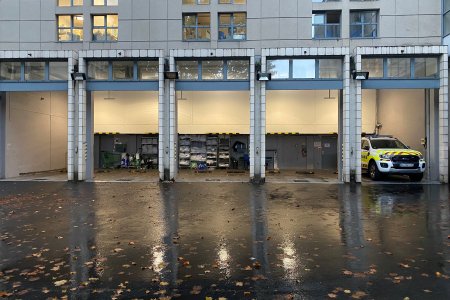 Olivier Guillard
Interview
Olivier Guillard
Interview
12/08/2022
Jean-Sébastien Marx
Olivier Guillard
Elba Rahmouni
“Death is an extremely grave non-emergency; its only treatment is mourning”. That is how doctor Miguel Martinez Almoyna introduces his concept of emergency. The retired 92-year-old anaesthesiologist played an active role in creating France’s SMUR, and later SAMU, emergency medical systems. Still quite active overseas (in Brazil and Mexico), where he has exported the French pre-hospital model, he explains his approach to régulation médicale, whose purpose is to guide patients to the medical services their condition requires while offering a range of responses corresponding to different degrees of severity and urgency.
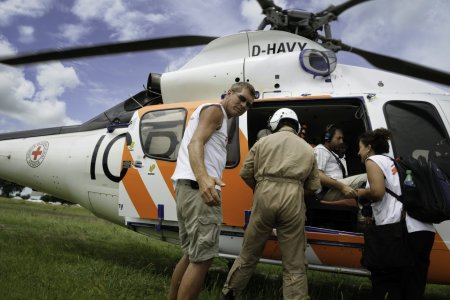 Robin Meldrum/MSF
Analysis
Robin Meldrum/MSF
Analysis
06/28/2019
Rony Brauman
The rehabilitation of international humanitarian law (IHL) has become a priority for those who think that the horrors of contemporary wars are largely due to the blurring of the distinction between civilians and combatants and for those who think that campaigning for the respect of IHL could result in more civilised wars. Similarly, respect for humanitarian principles is still seen by many as the best tool available to protect the safety of aid workers. In this text, I argue that both assumptions are misled. The distinction between civilians and combatants, a cornerstone of IHL, has been blurred in practice since the late nineteenth century. In addition, humanitarian agencies claiming to be ‘principled’ have been victims of attacks as much as others. History and current practice tell us that neither IHL nor humanitarian principles provide safety or can guide our decisions. Accepting their symbolic value, rather than their unrealised potential to protect and solve operational dilemmas, would free humanitarian agencies from endless speculations.
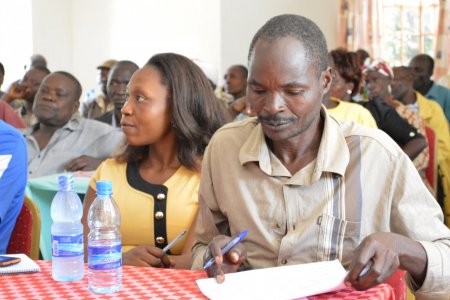 Wairimu Gitau/MSF
Interview
Wairimu Gitau/MSF
Interview
11/30/2022
Pierre Mendiharat
Elba Rahmouni
Léon Salumu Luzinga
This article was published on December 22nd, 2021, in the Journal of Humanitarian Affairs (Issue 3, Volume 3).
Despite a concerted international effort in recent decades that has yielded significant progress in the fight against HIV/AIDS, the disease continues to kill large numbers of people, especially in certain regions like rural Ndhiwa district in Homa Bay County, Kenya. Although there is still no definitive cure or vaccine, UNAIDS has set an ambitious goal of ending the epidemic by 2030, specifically via its 90-90-90 (treatment cascade) strategy – namely that 90 per cent of those with HIV will know their status; 90 per cent of those who know their status will be on antiretroviral therapy and 90 per cent of those on antiretroviral therapy will have an undetectable viral load. These bold assumptions were put to the test in a five-year pilot project launched in June 2014 by Médecins Sans Frontières (MSF) and Kenya’s Ministry of Health in Ndhiwa district, where an initial NHIPS 1 study by Epicentre (MSF’s epidemiology centre) in 2012 revealed some of the world’s highest HIV incidence and prevalence, and a poor “treatment cascade”. Six years later a new Epicentre study, NHIPS 2, showed that the 90-90-90 target had been more than met. What explains this ‘success’? And given the still-high incidence, is it truly a success? What follows is an interview on the political, scientific, and operational challenges of the Ndhiwa project with MSF Deputy Director of Operations Pierre Mendiharat and physician Léon Salumu, Head of MSF France Kenya programs, conducted by Elba Rahmouni.
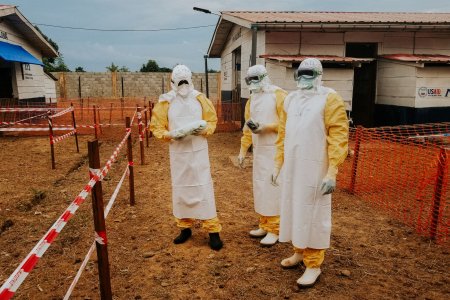 MSF
Analysis
MSF
Analysis
11/04/2022
Natalie Roberts
This article was published on December 22nd, 2021 in the Journal of Humanitarian Affairs (Issue 3, Volume 3).
In this article, Natalie Roberts analyses the actions and positioning of MSF during the Ebola outbreak in Nord Kivu (Democratic Republic of Congo, 2018-2020).
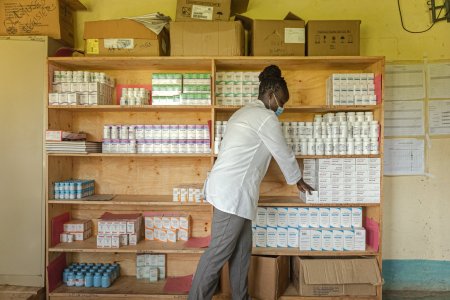 Njiiri Karago/MSF
Analysis
Njiiri Karago/MSF
Analysis
09/16/2022
Rony Brauman
In this article, Rony Brauman identifies the dynamics and events that made bending the HIV/AIDS epidemic curve possible. He explains the climate in which the tug-of-war with parts of the pharmaceutical industry played out from MSF’s perspective, and recalls that fears about international security and political stability also helped push governments to mobilise against the epidemic.
 Analysis
Analysis
11/14/2021
Elba Rahmouni
Pierre Mendiharat
Léon Salumu Luzinga
This article was first released in the 18th volume of the Humanitarian Alternatives magazine. Designed to reduce the incidence of HIV/AIDS in a Kenyan district, a Médecins Sans Frontières project successfully exceeded the “90-90-90” target set by UNAIDS. A look back on the results that the authors of this article - Pierre Mendiharat, Deputy director of operations at MSF France and Léon Salumu Luzinga, Program manager at MSF France, interviewed by Elba Rahmouni - believe are encouraging but by no means a guarantee that the epidemic will be over by 2030.
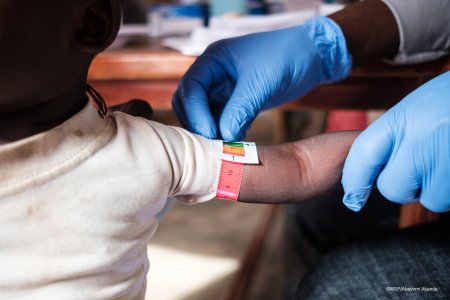 Abayomi Akande
Interview
Abayomi Akande
Interview
05/05/2022
Jean-Hervé Bradol
Elba Rahmouni
All the warning lights are flashing red this year: drought, the high prices of grains and fertilisers exacerbated by the war in Ukraine, reduced imports and speculation, numerous armed conflicts, a record number of refugees to be fed, disengagement of institutional donors,… With the exception of locusts, all the determinants of severe food scarcity are there, from Afghanistan to the Sahel, including Yemen, the Horn of Africa, and the Indian subcontinent. To the point of threatening all of the progress that was made in treating undernutrition after the 2005 crisis in Niger, which was the starting point for global advances in managing malnutrition in places where it is commonplace. It is time for a general mobilisation to limit the scale of the coming catastrophe. Interview with Jean-Hervé Bradol by Elba Rahmouni.
 Analysis
Analysis
05/16/2022
Bertrand Taithe
The Swiss editor Georg just published in open access a collection of articles edited by Sébastien Farré, Jean-François Fayet and Bertrand Taithe. This book is devoted to the emergence of humanitarian exhibitions either within wider events or in their own right, as an attempt to focus attention and make sense of the aid humanitarians provided. The book argues that this exhibition process was central to the narration of the humanitarian project. It did not simply represent humanitarian work, it helped shape its essential identity and sense of purpose. Entail the development of new ways of thinking about needs and emergencies.
 Alexis Huguet/MSF
Analysis
Alexis Huguet/MSF
Analysis
04/27/2022
Elba Rahmouni
Olivier Guillard
Based on the example of the hospital in Moïssala, Chad, the two authors reflect on the management of pain in children at Médecins Sans Frontières. This article was first published on March 25th 2022 in the journal Alternatives Humanitaires.
 Mariana Abdalla/MSF
Analysis
Mariana Abdalla/MSF
Analysis











